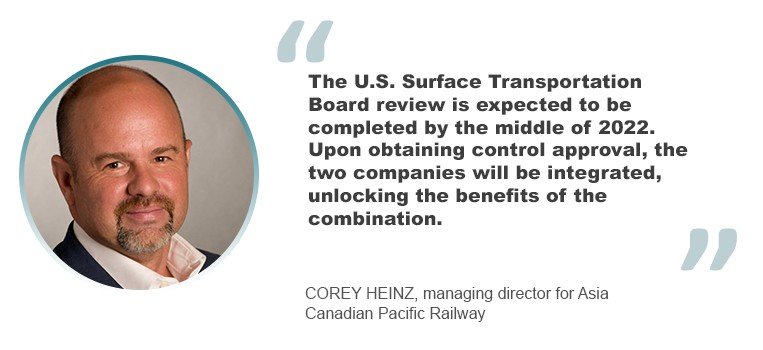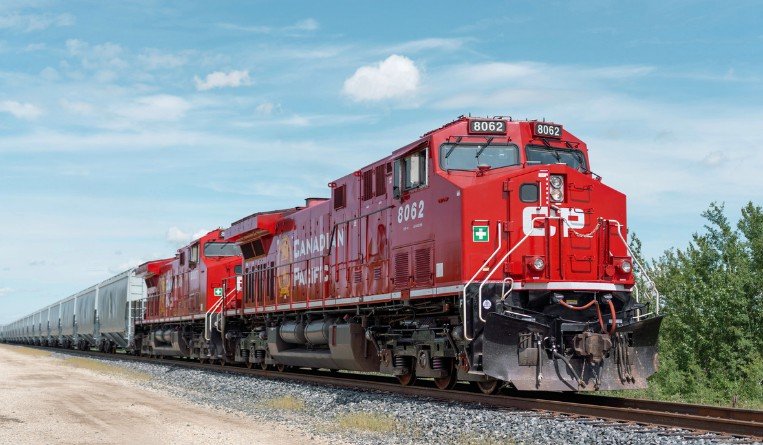Shippers and carriers from Asia are expected to benefit from the recently announced merger between Canadian Pacific Railway (CP) and Kansas City Southern (KCS), two of North America’s largest railroads. The merger will create the first Mexico-U.S.-Canada freight network in history.
The US$29 billion deal will combine two of the industry’s fastest-growing rail companies at a time when both air and sea capacity have been struggling to cover the surge in demand brought by increasing online purchases and the wide-ranging impact of the coronavirus pandemic.
CP and KCS announced their intent to combine in March. The deal, which has faced opposition and a competing bid from rival Canadian National Railway, would create the first Class 1 railroad that spans all of North America, connecting the U.S., Mexico, and Canada as the United States-Mexico-Canada Agreement (USMCA) – which replaced the former North American Free Trade Agreement (NAFTA) deal between the three countries – takes hold.
On April 20, Canadian National announced a cash and stock bid valued at US$33.7 billion for KCS, topping the US$25 billion bid made in March by CP. CP has argued that such a deal would be anticompetitive and would “destabilize” the rail network balance in North America.
Corey Heinz, managing director Asia at Canadian Pacific Railway, said that although the deal is still “early in the process,” the firms “expect this will benefit customers across the board, including those in Asia.”
“The U.S. STB [Surface Transportation Board] review is expected to be completed by the middle of 2022. Upon obtaining control approval, the two companies will be integrated, unlocking the benefits of the combination,” Heinz told Asia Cargo News.

CP said in a statement that for “Asian shippers, the connections would provide increased connectivity seamlessly from Vancouver to Mexico and for carriers transiting the Panama Canal provide direct access to Houston and New Orleans.”
The new single-line haul offerings will also deliver “dramatically expanded market reach” and new competitive transportation options.
“[It will provide] enhanced service offerings, lower transit times, and direct access to premier ports in the US Gulf, Atlantic and Pacific coasts, which improve efficiency and asset utilization,” CP said, noting that the combined network of both CP and KCS will also offer “expanded and alternative network routes that provide more options and improved access to, and around, Chicago.”
CP noted that the merger will also provide “operational efficiency and seamless integration of the two systems without service disruption” and that there will be “no elimination of any existing competitive routing options” – enhancing competition.
The combined company will be called Canadian Pacific Kansas City and will operate some 32,000 km of rail running across the three countries. Once approved, the rail companies would join their networks in Kansas City giving its customers access to Canada, the U.S. Midwest, the U.S. Northeast, the South Central United States and Mexico through the interchange point in Kansas City.
“This transaction will alleviate the need for a time consuming and expensive interchange, improving efficiency and reducing transit times and costs. The combination also will allow some traffic between KCS-served points and the Upper Midwest and Western Canada to bypass Chicago via the CP route through Iowa,” CP said in a statement announcing the merger.
CP and KCS made a filing with the STB in April asserting their right to have the STB review their combination under a waiver that STB granted to KCS in 2001. The rail networks said the filing was made “in response to objections to the application of the KCS waiver that were filed with the STB by competitors and others” – insisting that the logic under which the 2001 exemption was granted to KCS remains valid today.
CP and KCS noted that “[n]o party has raised any basis for concern with the merits of the transaction itself; rather, they merely seek to make the already-robust regulatory review process more time-consuming and burdensome.”
The rail networks also argued that more than 375 shippers, ports, partners and customers have shown their support for the merger that would create a single-line route from Canada to Mexico.
Charlee C. Delavin



